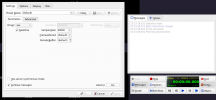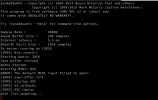Hello,
So after some researching i did not find anything useful in handbook or wiki about how can i set up simple MIDI for software synths..
So what i need is very simple i need audio/bristol to work with jack in order to record simple tunes for my project. So far i loaded sndiod module and nothing happened.
Only midi thing i have in /dev is midistat and when i run
So JACK is running just fine but MIDI driver option is greyed out.. Does MIDI even work on FreeBSD?
EDIT:
Some screenshots.. I also tried audio/zynaddsubfx but with no luck..
So after some researching i did not find anything useful in handbook or wiki about how can i set up simple MIDI for software synths..
So what i need is very simple i need audio/bristol to work with jack in order to record simple tunes for my project. So far i loaded sndiod module and nothing happened.
Only midi thing i have in /dev is midistat and when i run
cat /dev/midistat i got this:FreeBSD Midi Driver (midi2)
No devices installed.
So JACK is running just fine but MIDI driver option is greyed out.. Does MIDI even work on FreeBSD?
EDIT:
Some screenshots.. I also tried audio/zynaddsubfx but with no luck..



